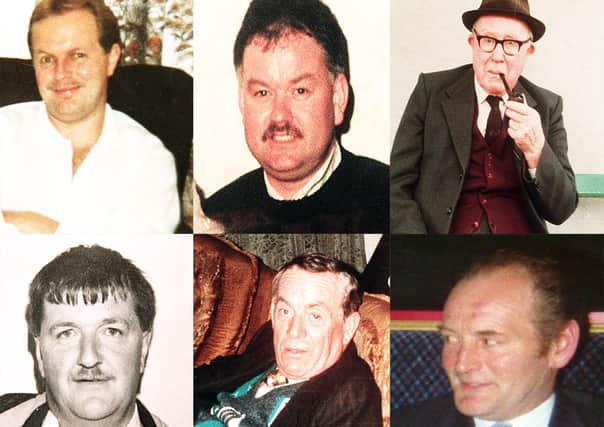Court of Appeal rules Police Ombudsman ‘overstepped the mark’ in Loughinisland findings - but will not quash report on atrocity


But judges rejected a bid by two retired senior policemen to quash the watchdog’s entire public statement on the Loughinisland atrocity.
They accepted it had been appropriate for the Ombudsman to acknowledge what he had uncovered was in line with the views of the victims’ families on corrupt relationships between security force personnel and the paramilitary killers.
Advertisement
Hide AdAdvertisement
Hide AdLord Chief Justice Sir Declan Morgan identified three sections in the disputed report where he went beyond his powers in reaching emphatic conclusions.
“The determinations he made in the three offending paragraphs... overstepped the mark by amounting to findings of criminal offences by members of the police force,” Sir Declan said.
The verdict was delivered on the 26th anniversary of the atrocity.
UVF gunmen opened fire at the Heights Bar in Loughinisland, Co Down as their victims watched a World Cup football match in June 1994.
Advertisement
Hide AdAdvertisement
Hide AdThe men killed were: Adrian Rogan, 34, Malcolm Jenkinson, 53, Barney Green, 87, Daniel McCreanor 59, Patrick O’Hare, 35, and Eamon Byrne, 39.
Five others were also wounded in a sectarian attack for which no-one has been brought to justice.
In June 2016 the then Ombudsman, Dr Michael Maguire, said collusion between some officers and the loyalists was a significant feature in the murders.
He found no evidence police had prior knowledge, but identified “catastrophic failings” in the investigation.
Advertisement
Hide AdAdvertisement
Hide AdRaymond White, representing the Northern Ireland Retired Police Officers’ Association, and Ronald Hawthorne, a former sub-divisional police commander, have been involved in a long-running legal challenge to the published findings.
A first hearing resulted in a ruling in 2017 that the report was procedurally unfair and had failed to make clear it conclusions did not apply to Mr Hawthorne.
At that time the watchdog agreed to remove any references to him to ensure he is not connected to any alleged wrongdoing - a move seen as complete vindication for the former police commander.
A limited re-hearing before a different judge focused only on issues around the extent of the powers to publish the findings.
Advertisement
Hide AdAdvertisement
Hide AdIn November 2018 a High Court judge rejected the retired officers’ case that Dr Maguire had exceeded his legal remit and refused to quash the report.
Mr White and Mr Hawthorne mounted an appeal against that ruling.
The former policemen’s barrister stressed their complete support for the Ombudsman’s role in scrutinising and holding officers to account.
He argued, however, that the watchdog lacked the legislative authority to publish such “conclusive findings” in the Loughinisland report.
Advertisement
Hide AdAdvertisement
Hide AdThe Police Ombudsman simply does not have that power, counsel claimed.
Judges were told that an organ of the state was effectively finding police officers guilty.
Lawyers for the Ombudsman countered that the legislation allowed him to express an opinion on the alleged collusion.
Ruling on the appeal, Sir Declan acknowledged the anniversary of the Loughinisland killings, as well as the loss and hurt suffered due to the “barbarous attack”.
Advertisement
Hide AdAdvertisement
Hide Ad“Compared to that this judgment is relatively unimportant, buy I hope it will provide a basis for all to understand what victims and police can expect from the proper conduct of complaints by the Ombudsman pursuant to the Police (Northern Ireland) Act 1998,” he said.
The Chief Justice set out how the dispute centred on comments in a summary chapter of the report.
He confirmed: “We consider that the emphatic conclusions reached by the Ombudsman in the three offending paragraphs go beyond mere modes of expression and exceed his powers.
“We do, nevertheless, uphold the decision of the judge at first instance not to strike down the public statement because of what was written therein.”
A further hearing may now be required to deal with any further remedies on that section of the report.